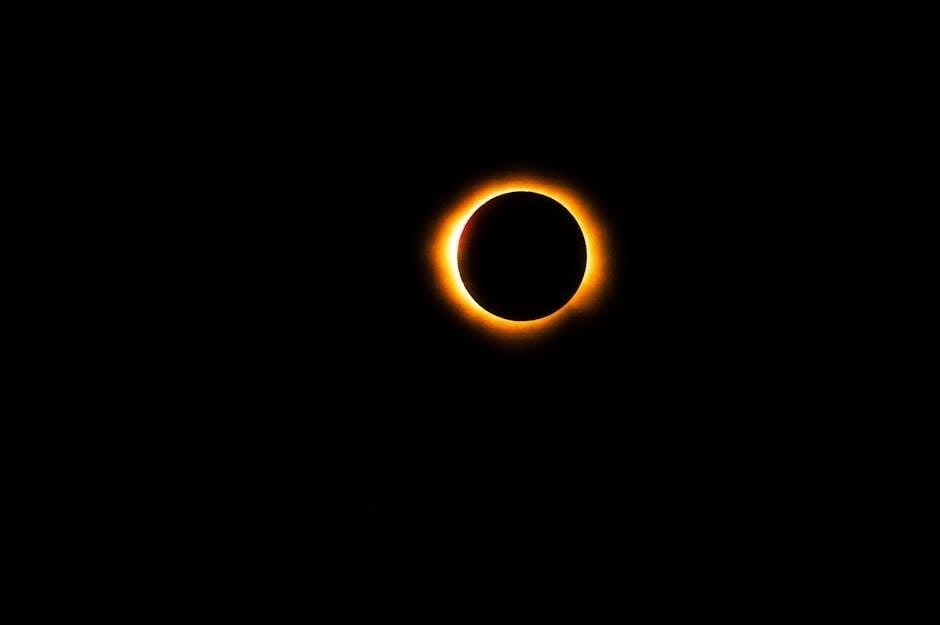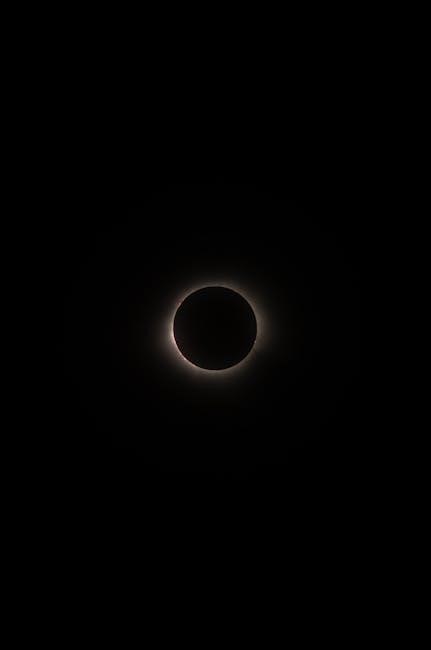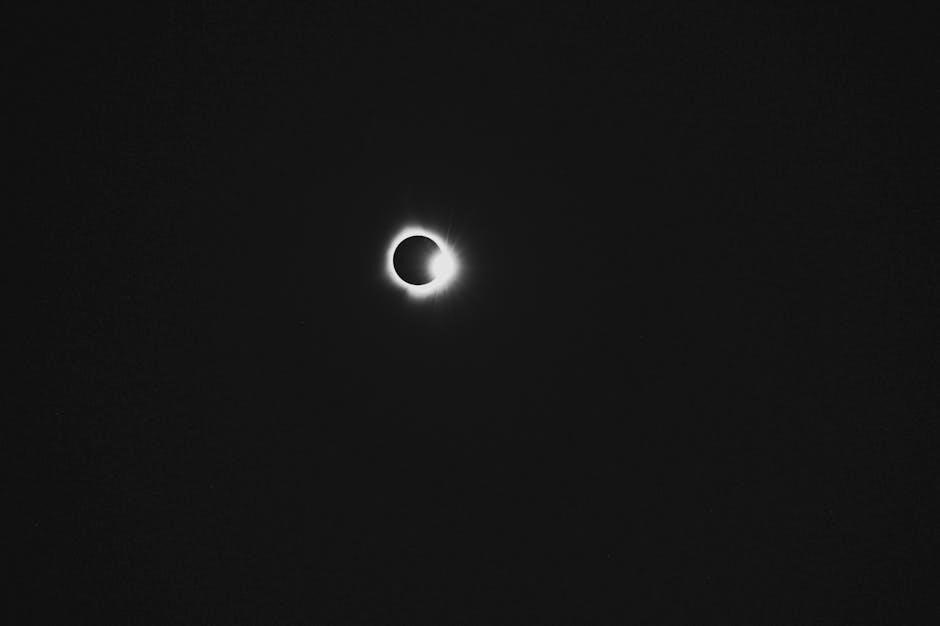Annie Dillard’s Total Eclipse is a captivating nonfiction essay from her collection Teaching a Stone to Talk (1982). It vividly recounts her transformative experience during a solar eclipse, blending descriptive imagery with profound philosophical reflections on human existence and the cosmos.

Background and Context of the Essay
Annie Dillard’s essay Total Eclipse is part of her 1982 collection Teaching a Stone to Talk, which explores themes of nature, human existence, and the divine. The essay recounts Dillard’s firsthand experience of a total solar eclipse in central Washington in 1979. This rare celestial event provided a unique backdrop for her philosophical reflections. Solar eclipses have historically been viewed as awe-inspiring and often terrifying phenomena, captivating human imagination across cultures. Dillard’s account captures the scientific wonder of the event, describing the moon’s passage between Earth and the Sun, while also delving into its emotional and existential impact. Her narrative blends precise observations of the natural world with deeply personal and metaphysical insights. The essay is notable for its ability to convey the profound disruption caused by the eclipse, not only to the environment but also to Dillard’s own perception of reality and humanity’s place within the cosmos. This duality of scientific observation and philosophical inquiry defines the essay’s enduring appeal.

Analysis of the Essay’s Content
Dillard’s essay masterfully intertwines vivid descriptions of the eclipse with profound existential reflections, capturing the awe-inspiring spectacle while exploring humanity’s fragile place within the vast and indifferent universe.
Dillard’s Personal Experience During the Eclipse
Annie Dillard’s personal account of the total solar eclipse is deeply immersive, capturing her awe and existential unease. She witnessed the event in central Washington in 1979, describing it as an otherworldly experience that felt centuries removed from reality. Dillard vividly recounts the sudden darkness, the stark beauty of the corona, and the eerie backdrop of the blackened sky. Her narrative conveys both the excitement of the crowd and her own internal struggles to process the magnitude of what she was seeing. The eclipse evoked a mix of fear and wonder, as Dillard grappled with the realization of humanity’s insignificance against the vast, indifferent universe. Her prose masterfully blends sensory details with philosophical musings, creating a transformative experience for both herself and the reader. The essay underscores how the eclipse reshaped her perspective on life, time, and human existence, leaving an indelible mark on her consciousness.
Literary Devices and Descriptive Techniques
Annie Dillard employs a rich array of literary devices in Total Eclipse, enhancing the essay’s emotional and philosophical depth. Her vivid descriptions of the eclipse create a visceral experience, such as comparing the sun to a “segment of tangerine” and the sky to a “blackened” backdrop. Dillard’s use of metaphors and similes bridges the gap between the cosmic event and human understanding. Her narrative structure is unconventional, oscillating between lyrical prose and abrupt, fragmented sentences, mirroring the disorienting nature of the eclipse. The essay’s language is both poetic and precise, evoking a sense of awe and unease. Dillard’s ability to weave scientific observation with personal introspection underscores the transformative power of the event. Her descriptive techniques not only paint the scene but also invite readers to reflect on their own place within the vastness of the universe, making the essay a masterful blend of storytelling and philosophical inquiry.

Themes and Symbolism in “Total Eclipse”
Annie Dillard’s essay explores existential reflections, the universe’s indifference, and humanity’s moral interconnectedness. The eclipse symbolizes life’s fleeting nature, challenging perceptions of human significance and cosmic order, while inviting profound introspection into existence and consciousness.
Existential and Philosophical Themes
Annie Dillard’s Total Eclipse delves into profound existential and philosophical themes, using the solar eclipse as a metaphor for life’s transient nature. Dillard reflects on humanity’s place within the vast, indifferent universe, questioning the meaning of existence. The eclipse symbolizes the fleetingness of human experience, challenging readers to confront the cosmos’s enormity and their own insignificance. Dillard’s narrative explores the tension between human consciousness and the universe’s apathy, prompting a reevaluation of life’s purpose. Her vivid descriptions of the eclipse—its sudden darkness, eerie beauty, and transformative power—underscore the fragility of human understanding. The essay invites readers to ponder the absurdity of seeking meaning in an indifferent world, while simultaneously celebrating the beauty of existence. Through her philosophical musings, Dillard transcends the event itself, offering a meditation on the human condition and our precarious yet profound connection to the cosmos.
The Concept of the Universe’s Indifference
Annie Dillard’s Total Eclipse profoundly explores the concept of the universe’s indifference, using the solar eclipse as a metaphor for cosmic detachment. The sudden darkness and eerie beauty of the event evoke a sense of existential awe, yet also underscore humanity’s insignificance. Dillard describes the eclipse as a “cosmic drama” that operates without regard for human presence or emotion. The universe, in her depiction, is vast, impersonal, and unconcerned with human affairs. This theme is reinforced by her description of the sun’s disappearance, which symbolizes the arbitrary and indifferent nature of cosmic events. Dillard’s narrative suggests that while humans seek meaning and connection, the universe remains indifferent to their existence. This realization is both humbling and liberating, prompting readers to confront the reality of their place within an immense, uncaring cosmos. The eclipse, in this sense, serves as a stark reminder of humanity’s smallness and the universe’s unfathomable silence.
Moral Connectivity and Human Existence
Annie Dillard’s Total Eclipse delves into the theme of moral connectivity, exploring how human existence is intertwined with ethical responsibility. The essay suggests that the fleeting nature of the eclipse mirrors the transience of human life, emphasizing the importance of living with intention and compassion. Dillard reflects on the moral implications of human actions, urging readers to recognize their place within a larger web of existence. She contemplates the fragility of human connections and the need to cherish them, as the universe’s vastness and indifference highlight the uniqueness of human relationships. The eclipse serves as a metaphor for the impermanence of life, prompting Dillard to advocate for a deeper sense of empathy and moral awareness. Her narrative underscores the idea that, despite the universe’s indifference, human existence is enriched by our capacity for love, kindness, and ethical engagement with the world and each other. This theme resonates as a call to embrace the beauty and responsibility of human connection in an often uncaring cosmos.

Impact and Legacy of the Essay
Total Eclipse has become a landmark essay in American literature, celebrated for its lyrical prose and philosophical depth. It remains widely studied, inspiring reflections on nature, existence, and human connection, influencing countless writers and readers alike.
Critical Reception and Popularity
Total Eclipse has garnered widespread critical acclaim for its lyrical prose and profound philosophical insights. Critics praise Dillard’s ability to weave vivid descriptions of the eclipse with deeper reflections on human existence. The essay is celebrated as a landmark piece in American literature, often included in anthologies and studied in academic settings. Its popularity stems from its universal themes, which resonate with readers across disciplines, inspiring discussions on nature, consciousness, and the cosmos. Many scholars and writers have lauded Dillard’s unique narrative style, which balances scientific observation with poetic introspection. The essay’s influence extends beyond literature, impacting educators and thinkers who appreciate its ability to provoke existential questioning. It remains a favorite among literature enthusiasts and continues to be a pivotal text in explorations of human connectivity and the natural world, solidifying its place as a timeless work of nonfiction.
